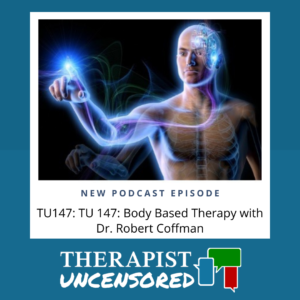Podcast: Play in new window | Download (Duration: 1:14:02 — 50.8MB)
Subscribe: Apple Podcasts | Spotify | Amazon Music
Body-based therapy is important because there is no difference between the mind and the body.
Our Patrons linked us with the guest for this show – check them out here!
Bioenergetic therapist Dr. Robert Coffman joins co-host, Dr. Ann Kelley, for a conversation on body-focused therapy. Learn more about the interplay between our nervous systems and how it all relates to attachment and trauma.
We are diving into body-focused therapy today thanks to one of our patreon's, who recommended this expert. In today's episode join co-host Dr. Ann Kelly and Dr. Robert Coffman's conversation on using the body to heal the mind. This therapy has been around for over 100 years but it is still not commonplace in a lot of therapy practices.
“The trauma is stored in a part of the brain that's not accessible with language.”
Body-focused therapy is old.
William Reich published Mass Psychology of Fascism in 1933 and in 1936 was excluded from the International Society of Psychoanalysis. Nonetheless, Reich’s ideas inspired the development of several branches of body psychotherapy, including bioenergetic analysis, biosynthesis, and Hakomi, to name a few.
Today, body psychotherapy is practiced in many forms by therapists around the world. Associations such as the European Association of Body Psychotherapy (EABP) and the United States Association for Body Psychotherapy (USABP) oversee the field of body psychotherapy and offer training to interested professionals.
Dr. Robert Coffman joins co-host Dr. Ann Kelley for a discussion on body-focused therapy. Body mind brain what is the difference? Your body can determine how you are feeling internally, and you can enhance and limit your progress based on how your body positioning. Freud was able to see depression in someone's chest.
You can see signs of being closed off in the body position even when someone believes that are open to connection.
Who is Dr. Robert Coffman?
Learn about therapist uncensored
Those who truly understand body-focused therapy don't need to hear the story, they can see it working on your physical body.
Robert Coffman episode details:
- Why the body needs to be brought into therapy.
- What muscular holding patterns are.
- How the body has reflexive responses to situations.
- Preventing dorsal vagal shutdown in children.
- The Body Doesn't Lie.
- How posture impacts our mental state.
- The ability to feel emotions in your body, and using the body to work through them.
- When you work with the body, transference changes.
- How our body stores energy and emotion.
- The profound impact of realizing how your body relates to the deeper meaning
Panic Attack is just a label for different things that are happening in the body. You can diffuse that energy.
Resources:
Links:
Dr. Coffman provided a scan of some important pages of The Field of Body Psychotherapy
https://www.bioenergetic-therapy.com/index.php/en/
https://www.bioenergetic-therapy.com/index.php/en/ba-resources/awarded-articles
Bioenergetics: The Revolutionary Therapy That Uses the Language of the Body to Heal the Problems of the Mind by Alexander Lowen.
- Body Psychotherapy by Nick Totton
- Body Psychotherapy edited by Tree Staunton
- Body-Centered Psychotherapy by Ron Kurtz
- About a Body edited by Jenny Corrigall and others
- Body, Brain, Love: A therapists workbook for Affect Regulation and Somatic Attachment. by Karen Rachels
- Body Process by James Kepner
- Emotional Anatomy by Stanley Keleman
- Relational Somatic Psychotherapy by Robert Hilton
- In an Unspoken Voice by Peter Levine
- Embodied Relating by Nick Totton
- Healing the Fragmented Selves of Trauma Survivors by Janina Fisher
- Psychology of the Body by Elliot Green and Barbara Goodrich Dunn
Haven't learned enough about body therapy?
TU65: Sensorimotor Psychotherapy – Tuning Into the Wisdom of Your Body With Guest Dr. Pat Ogden
TU107: What is Somatic Experiencing With Guest Abi Blakeslee
TU99: Food, The Body, Trauma, & Attachment With Guests Paula Scatoloni & Rachel Lewis-Marlow














